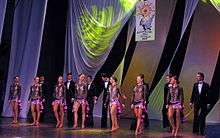Žuvėdra

Klaipėda University DSC Žuvėdra (literally: tern) is a dancesport formation dance team since 1995 affiliated with Klaipėda University, Klaipėda, Lithuania. It is a 7-time world champion and 9-time European champion. It was founded in 1965 by ballroom dancer Ona Skaistutė Idzelevičienė. She and her husband Romaldas Idzelevičius (since 1971) are the primary trainers.[1]
Since 1989, the team participated in World and European Championships. During 1995–2006, it was in the top 3 in European and World Latin Formation Championships, taking world first places in 2002–05. In 2006–13, the club formed the second team that participated in most important competitions.[1] Besides competitions, the team performed at various events in many European countries. In total, the team performed 14 different compositions[2] (music by composer Audrius Balsys since 1997, costumes by Aina Zinčiukaitė since 1999).[1]
The team did not compete in the 2014 season as, after retirement of a cohort of experienced dancers in 2012–13, there were not enough replacements.[2] In a press interview, the trainers blamed a higher education reform that made it more difficult for potential dancers to get admitted to Klaipėda University.[3] Additionally, the team faced financial difficulties: it could not offer stipends to its dancers, only small discounts on tuition fees. Therefore, dancers had to balance studies, work, and practice.[2]
Championship results
| Year | World Championship[1] | European Championship[1] | ||
|---|---|---|---|---|
| Location | Place[4] | Location | Place[5] | |
| 1989 | Germany | 7 | ||
| 1991 | Germany | 5 | ||
| 1992 | Austria | 4 | Germany | 4 |
| 1993 | Norway | 4 | Germany | 4 |
| 1994 | Germany | 3 | Germany | 5 |
| 1995 | Germany | 3 | France | |
| 1996 | Lithuania | Germany | ||
| 1997 | Germany | 3 | Poland | |
| 1998 | Sweden | 3 | Hungary | 3 |
| 1999 | Lithuania | Belarus | ||
| 2000 | Austria | Czech | ||
| 2001 | Germany | Hungary | ||
| 2002 | Lithuania | Holland | ||
| 2003 | Germany | Czech | ||
| 2004 | Belarus | Germany | ||
| 2005 | Germany | Germany | ||
| 2006 | Germany | Lithuania | ||
| 2007 | Germany | 3 / 6 | Germany | |
| 2008 | Austria | Germany | ||
| 2009 | Germany | Lithuania | ||
| 2010 | Russia | Germany | ||
| 2011 | Lithuania | Russia | ||
| 2012 | Germany | Austria | ||
| 2013 | Germany | 4 | Lithuania | |
| Note: from 2006, Žuvėdra had a second team competing. Its results are shown after the "/" symbol. | ||||
See also
References
- 1 2 3 4 5 Liatukas, Renata; Idzelevičius, Romaldas (2013). "„Žuvėdra"". In Karoblis, Povilas; et al. Lietuvos sporto enciklopedija (in Lithuanian). II. Lietuvos sporto informacijos centras. pp. 1050–1051. ISBN 978-609-413-003-8.
- 1 2 3 Augustis, Mindaugas (2014-03-14). "Pasaulyje lygių neturėjusi „Žuvėdra" – ties išnykimo riba" (in Lithuanian). Delfi.lt. Retrieved 2015-02-14.
- ↑ LRT radijo laida „60 minučių“ (2014-11-14). "Pagrindinė „Žuvėdros" ansamblio subyrėjimo priežastis – ne pinigai" (in Lithuanian). Delfi.lt. Retrieved 2015-02-14.
- ↑ Spaeker, Heinz. "Results of IDSF Competitions". DanceSport Services.
- ↑ "Žuvėdros skrydžiai" (in Lithuanian). Lithuanian Dancesport Federation. Retrieved 2015-02-14.